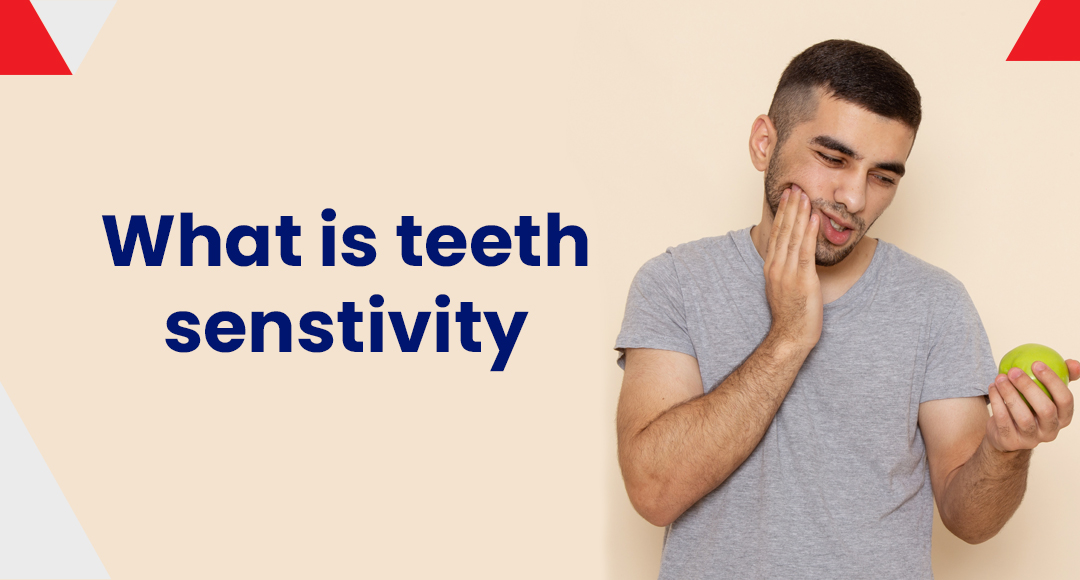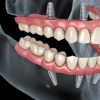WHAT IS TEETH SENSITIVITY?
Have you ever experienced pain or discomfort after eating an ice cream or a spoonful of hot soup? If this is the case, you are not alone. While pain from hot or cold foods may indicate a cavity, it is also typical in people with sensitive teeth. Tooth sensitivity, or “dentin hypersensitivity,” is the sensation of pain or discomfort in the teeth due to particular stimuli, such as hot or cold temperatures.
It can be a temporary or persistent condition that affects one tooth, multiple teeth, or all of the teeth in a single person. Various factors can cause it, but most cases of sensitive teeth are readily addressed with a modification in your oral hygiene regimen.
Teeth sensitivity can arise from consuming cold, hot, sweet, or sour meals and beverages or breathing cold air. Sharp pain can strike deep into dental nerve ends. Fluoride, desensitizing toothpaste, and dental bonding are all treatments.
This blog discusses what teeth sensitivity is, what causes sudden tooth sensitivity, whether a sensitive tooth means infection, whether sensitive tooth pain can go away, how to stop sensitive teeth pain, and much more.
What is teeth sensitivity?
You probably have sensitive teeth if you feel a sharp, short, painful feeling in your teeth when you sip an iced drink, bite into ice cream, or slurp a mouthful of boiling soup. Tooth sensitivity is an extreme reaction to stimuli such as sweet, hot, cold, or acidic foods and beverages, cold air exposure, and even brushing your teeth.
Teeth discomfort typically arises when the dentin, the underlying layer of your teeth, becomes exposed. It can occur due to wear and tear or gum recession (when your gum tissue pulls away from your teeth, exposing the roots).
Teeth roots, which are not covered by hard enamel, contain thousands of microscopic tubules that lead to the center of your tooth (the pulp). These dentinal tubules (or channels) allow stimuli, such as cold, heat, or sweet food, to reach the nerve in your tooth, causing pain. Dental sensitivity can also signify another problem, such as gum disease, cavities, or a damaged tooth.
What causes sudden tooth sensitivity?
Many causes can contribute to the development of sensitive teeth, such as:
- Brushing too hard or using a firm-bristled toothbrush can wear down enamel and expose dentin over time. It can also lead to gum recession.
- Gum recession: Some people are born with thin gum tissue. Periodontal disease can also cause gum recession in some patients. Gum recession happens when the gum tissue pulls away from the teeth, exposing the roots.
- Gum disease: Sensitivity may result from the loss of supporting ligament exposing the root surface, which connects straight to the tooth’s nerve.
- Age: Most people face sensitivity between 25 and 30.
- Plaque buildup: Plaque buildup on the root surfaces can cause sensitivity.
- Use of mouthwash: Some over-the-counter mouthwashes include acids that can aggravate tooth sensitivity if your dentin is exposed. The acids cause more damage to the dentin layer of the tooth. (the middle layer of the tooth). Ask your dentist to prescribe a neutral fluoride solution if you have dentin sensitivity.
- Acidic foods: Consuming foods with a high acid content regularly, including tomatoes, pickles, citrus fruits, and tea, can cause enamel erosion.
- Recent dental procedures: Fillings, tooth cleanings, and dental restoration implantation can all cause painful teeth. Dental procedure sensitivity is transient and usually disappears in four to six weeks.
Does a sensitive tooth mean infection?
Not all of the time. Teeth sensitivity can be caused by tooth erosion (wear and tear) or gum recession. However, it could also indicate that you have a damaged or infected tooth. Pain from an infection might be subtle and achy or severe and throbbing. If you have significant teeth sensitivity that isn’t going away, contact your dentist immediately for further instructions.
Can sensitive tooth pain go away?
Yes. Teeth sensitivity may resolve independently in some circumstances, mainly from a recent dental operation, such as a filling or root canal. If your teeth sensitivity persists and does not go away, consult a dentist. You could have chipped enamel or exposed tooth roots. In some circumstances, you may require treatment to address the problem.
How do you stop sensitive teeth pain?
The underlying cause determines treatment. If you experience persistent tooth sensitivity or discomfort, visit your dentist. They’ll need to rule out any significant conditions before recommending treatment. To lessen your chances of experiencing tooth sensitivity due to regular wear and tear, follow these steps:
- Use desensitizing toothpaste: Various toothpaste products are available for sensitive teeth. Trying several different brands to find the best outcome would be best. Regular use should result in a decrease in sensitivity. Another tip: Before bed, apply a thin layer of toothpaste to the exposed tooth roots with your finger or a Q-tip. Make use of fluoridated toothpaste.
- Maintain good oral hygiene: Use proper brushing and flossing procedures to clean all parts of your teeth and mouth thoroughly.
- Use a soft-bristled toothbrush: This reduces toothbrush abrasion on the tooth surface and gum discomfort.
- Be mindful of what you eat: Consuming very acidic foods regularly might gradually disintegrate tooth enamel and expose dentin. They may also exacerbate sensitivity and initiate the pain response.
- Use fluoride dental products: Using a fluoridated mouth rinse daily can help reduce sensitivity. Inquire with your dentist about the products that are available for use at home.
- Prevent Teeth Grinding: Use a mouth guard while you sleep if you grind or clench your teeth to avoid teeth sensitivity.
- Visit the dentist frequently: Regularly visit a professional for cleanings, exams, and fluoride treatments.
Consult your dentist if the discomfort persists. Specific dental procedures could assist in reducing sensitivity, such as the use to cover exposed root surfaces, dental bonding, the application of fluoride varnish to the exposed root surface, and dentin sealers used on the root’s exposed surface.
When should I see my dentist for teeth sensitivity?
If you have teeth sensitive to hot or cold or sweets, make an appointment with your dentist.
What should I ask my dentist?
Here are five crucial questions you must ask your dentist if you experience discomfort.
My teeth are sensitive; why?
Do I need to get my sensitive teeth treated?
Do any remedies exist that can stop future tooth sensitivity?
Which over-the-counter medicines do you suggest?
How frequently should I get my teeth cleaned?
Take Away
Teeth sensitivity can be caused by several things, including worn enamel, exposed roots, cavities, fissures, and even recent dental treatments. The cause will determine whether you require therapy. You can treat mildly sensitive teeth with the help of desensitizing toothpaste and regular dental hygiene. Treatment may be necessary for extreme tooth sensitivity brought on by cavities, gum recession, or damaged teeth. Your dentist can suggest a course of treatment to address the problem and assist in determining what is causing your sensitive teeth.




